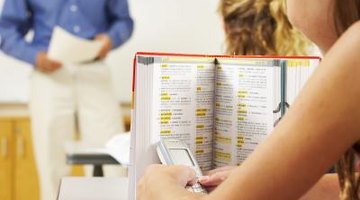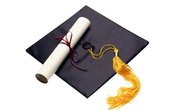High school is not only a time of transition, but also a period of preparation. While you're still in high school, you may be able to get away with a plethora of bad behaviors -- everything from sleeping in to not paying attention in class to turning in sloppy work. As you inch your way closer to graduation -- and before you head off to college -- you should work on shedding those bad behaviors.
Lack of Motivation
Perhaps you’re bored with the curriculum or teachers, and this has led you to feel unmotivated. If you’re feeling this way, you’re not alone; Forbes.com reports that up to 40 percent of high school students feel disengaged in the learning process. Even if studying the periodic table of elements or writing an essay isn’t your idea of fun, learning how to give each assignment your best effort -- no matter how boring the subject matter -- is a skill that will only benefit you in college, when the workload is heavier, the expectations are higher and the assignments are more complex.
Lack of Self-Reliance
Maybe your mom packs your lunch, wakes you up if you sleep through your alarm and makes sure you have your books and assignments on the way out the door. Or, if you do poorly on an assignment, your dad immediately emails your teacher, asking for bonus opportunities or a chance to redo the project or test. These kinds of behaviors will not benefit you in college. Now is the time to learn to become more self-reliant; when it comes to bad grades or missed assignments, be your own advocate in the classroom. Don’t rely on your parents to wake you up and pack your books or your lunch -- after all, when you’re away at college, mom and dad won’t be there to make sure you’re getting to class and turning in your assignments on time.
Multitasking
Maybe you listen to music or watch videos while studying, or you keep tabs on your social media account while writing a paper. Perhaps you text while the teacher is instructing. Although smartphones and tablets can be helpful academic tools, they can also serve as terrible distractions. Students take pride in being plugged in 24/7 and think that multitasking doesn't affect their learning, but research such as that conducted by Bridgewater State University overwhelmingly and unequivocally shows that students who multitask in class don’t learn as effectively or perform as well as their non-multitasking peers.
Unrestrained Social Media
While social media can allow you to stay connected to your friends and interests, it can also have devastating effects on your academic career if you use it without restraint. According to the American Psychological Association, the overuse of social media can cause teenagers to become more anxious and depressed, and it can also negatively impact achievement. Additionally, more colleges are scanning social media profiles and searching applicants’ names on Google as part of their application-screening process. So, those inappropriate comments and photos you thought were harmless? Well, they could mean the difference between acceptance to and rejection from your college of choice, as well as any scholarships for which you might have been eligible.
Related Articles
References
Writer Bio
Jennifer Brozak earned her state teaching certificate in Secondary English and Communications from St. Vincent College in Latrobe, Pa., and her bachelor's degree in journalism from the University of Pittsburgh. A former high school English teacher, Jennifer enjoys writing articles about parenting and education and has contributed to Reader's Digest, Mamapedia, Shmoop and more.










